英语口语18大语音音变现象例句
详细英语发音规则句子读法

英语发音1.语音弱化(schwa)Eg.a peace of cakeC a n y ou give it t o me?I had a n apple f o r lunch t o day.2.语音同化(t and p)Eg.A whi(te) peace of paperLots of grea(t) parks in LondonI ha(te) potatoes.3.语音同化(t and k)Eg.Credi(t) cardGe(t) coldDo i(t) quicklyTha(t) cake4.特殊连读(带R)(不是很强烈,捎带)解释:当上一词尾音为[ɔ:] ,下一次首音为[ə:时加R Eg.Law (r)and orderDraw (r)a pictureMy dog hurt its paw (r)on some broken glass.There was a flaw (r)in the argument.I saw (r)a good film last night.5.语音弱化(and变/ən/或/ə/)Eg.Fish and chipsThinking and thinkingGoing to go and get the shopping6.省音(elision of ‘t’)当’t’在两个辅音之间时,要省掉’t‘的发音Eg.I ca n’t do it.I ca n’t stand the rain.It mus t be time to leave.The firs t person hereI don’t want it.7.语音连读当一个单词以[d] 结尾,另一个单词以开头[j],则要结合成为[də(着]Eg.Would you →wouldyou even would yaI’m sa d y ou decided to quit.I don’t think the gol d y ou bought was real.8.语音弱化(have to→haft)9.语音连读(w)当一个单词的尾音是/u:/ ,下一个单词以原因开头则带一点稍稍的w(无)音。
英语中的一些变音现象及读音规则
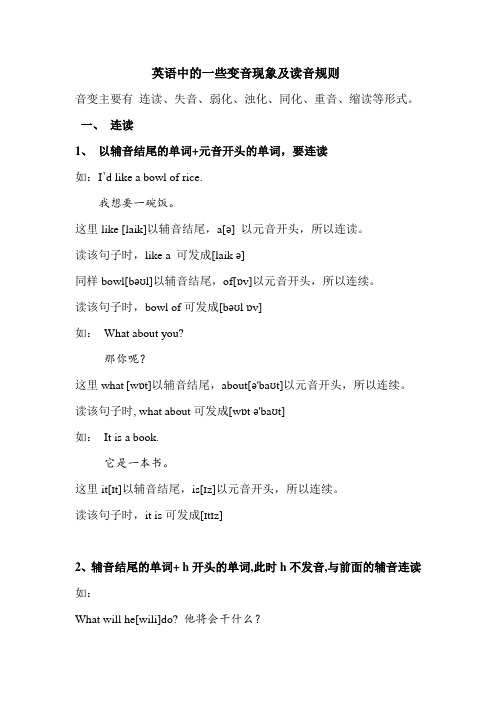
英语中的一些变音现象及读音规则音变主要有连读、失音、弱化、浊化、同化、重音、缩读等形式。
一、连读1、以辅音结尾的单词+元音开头的单词,要连读如:I’d like a bowl of rice.我想要一碗饭。
这里like [laik]以辅音结尾,a[ə] 以元音开头,所以连读。
读该句子时,like a 可发成[laik ə]同样bowl[bəʊl]以辅音结尾,of[ɒv]以元音开头,所以连续。
读该句子时,bowl of可发成[bəʊl ɒv]如:What about you?那你呢?这里what[wɒt]以辅音结尾,about[ə'baʊt]以元音开头,所以连续。
读该句子时, what about可发成[wɒt ə'baʊt]如:It is a book.它是一本书。
这里it[ɪt]以辅音结尾,is[ɪz]以元音开头,所以连续。
读该句子时,it is可发成[ɪtɪz]2、辅音结尾的单词+ h开头的单词,此时h不发音,与前面的辅音连读如:What will he[wili]do? 他将会干什么?Has he [hæzi]done it before?他之前做过这个吗?Must he [mʌsti] go?他一定要走吗?Can he [kæni] do it?他可以做吗?Should he[ʃədi]….?他应该…?Tell him to ask her[ɑːskɜː]….告诉他去叫她Leave him[liːvim].离开他For him [fɔ: im].对他而言3、“辅音+半元音”型连读英语语音中的/j/和/w/是半元音,如果前一个词是以辅音结尾,后一个词是以半元音,特别是/j/开头,此时也要连读。
如:Thank [θæŋk] you[juː] ,可读成[θæŋk juː].have [hæv]you[juː] ,可读成[hæv ju:]4、“r/re+元音”型连读如果前一个词是以-r或者-re结尾,后一个词是以元音开头,这时的r 或re不但要发/r/,而且还要与后面的元音拼起来连读。
英语的25个音变规则
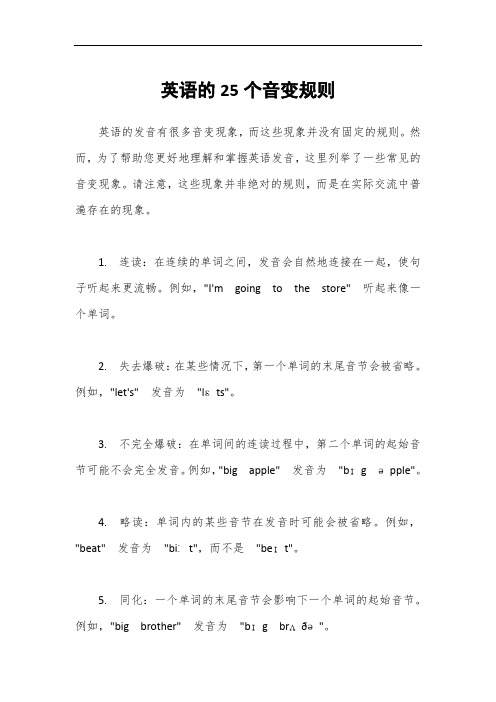
英语的25个音变规则英语的发音有很多音变现象,而这些现象并没有固定的规则。
然而,为了帮助您更好地理解和掌握英语发音,这里列举了一些常见的音变现象。
请注意,这些现象并非绝对的规则,而是在实际交流中普遍存在的现象。
1. 连读:在连续的单词之间,发音会自然地连接在一起,使句子听起来更流畅。
例如,"I'm going to the store" 听起来像一个单词。
2. 失去爆破:在某些情况下,第一个单词的末尾音节会被省略。
例如,"let's" 发音为"lɛts"。
3. 不完全爆破:在单词间的连读过程中,第二个单词的起始音节可能不会完全发音。
例如,"big apple" 发音为"bɪg əpple"。
4. 略读:单词内的某些音节在发音时可能会被省略。
例如,"beat" 发音为"biːt",而不是"beɪt"。
5. 同化:一个单词的末尾音节会影响下一个单词的起始音节。
例如,"big brother" 发音为"bɪg brʌðə"。
6. 弱读:在某些情况下,单词中的某些音节在发音时会变得较弱。
例如,"of" 在"a lot of" 中发音为"əv"。
7. 浊化:在某些情况下,清辅音在浊化环境下会变成浊辅音。
例如,"dog" 发音为"dɔg"。
8. 异化:单词的发音可能会受到周围单词的影响而发生变化。
例如,"fish" 在"fish and chips" 中发音为"fɪʃ"。
9. 音位替换:在某些情况下,单词中的一个音位会被另一个音位替换。
英语口语18大语音音变现象例句
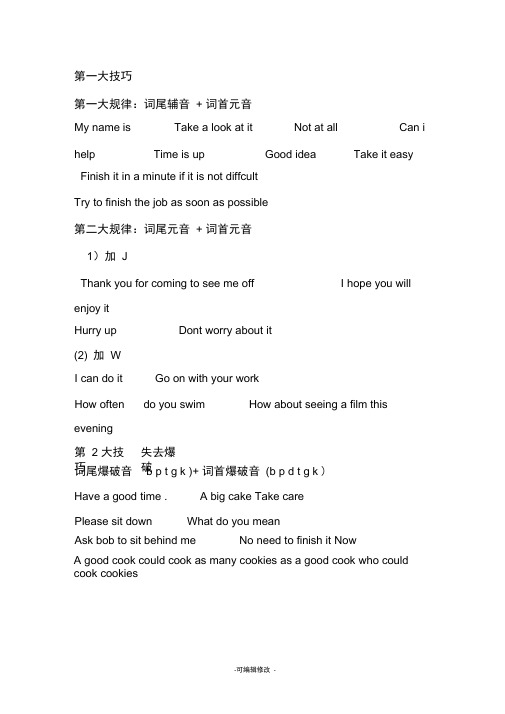
第一大技巧第一大规律:词尾辅音 + 词首元音Finish it in a minute if it is not diffcult Try to finish the job as soon as possible第二大规律:词尾元音 + 词首元音1)加 JThank you for coming to see me off enjoy it(2) 加 Weveningb p t g k )+ 词首爆破音 (b p d t g k )Ask bob to sit behind meNo need to finish it NowA good cook could cook as many cookies as a good cook who could cook cookies第 2 大技巧 失去爆破 Have a good time . A big cake Take care Please sit downWhat do you meanMy name is Take a look at it Not at all Can ihelpTime is upGood ideaTake it easyI hope you willHurry upDont worry about itI can do it Go on with your work How oftendo you swimHow about seeing a film this词尾爆破音第三大技巧 ;不完全爆破第一大规律:词尾摩擦音 + 摩擦音 ps 注意停顿,每句都有waterWhats the matter with you第二大规律:元音 +t+LI have a little problem第三大规律:连读后的浊化Not at all Say it again第 5 大技巧 第一大规律:相互同化 ( 1)t+j ——打不出来了Nice to meet youI know a lot about youI know you can speak good englishI think soI need some more moneyWhat would you advise me to do You must pay inadvance第二大规律:词尾爆破音 + 爆破音That jokeYou shouldnt treat women like objectCan i take a picture with you ?第四大技巧 浊化第一大规律:原音 +清辅音+ 元音 City letter water pretty citizen The sooner ,the better I think youd better see a doctorYour story just doesn 't holdStay out of this matterIll think about it Can i have a look at itTake care that you dont spoil your new clothes How about you(2)d+j-- 打不出Could you tell me where the bus stop isDid you finish your homework yesterdayWould you show me the bathroom(3)s+j-- 打不出来God bless you Baby i miss you everydayNow look what a mess you have done(4)z+j-- 打不出来How is your boyfriend Hows your family第二大规律:顺向同化(1)名词变复数:i want to buy a lot of english books(2)动词变第三人称单数:she works in zaidong education (3)动词变过去式或过去分词;she looked very blue yesterday (4)T+s :all of the students stop reading(5)D+s:my friends in america send me a message that the economic forecast is pleasant there第三大规律:逆向同化(1)before i eat dinner , i read the newspaper for a while(2)He is not the man he used to be3 )Dont worry , you get used to it in no time4 )You have to get off here5 )That is all he has to do6 )I had to go and talk with jim第六大技巧异化 ( 1)sp+ 元音:how do you spend your leisure timeAction speak louder than words (1)sk+ 元音:im so scaredIf i were a millionaire i would start a school(3) st+ 元音if you are ready,you may start your workWould you like some steak?(4) str+ 元音:the work is still strange to himHe struck me with a stick第七大技巧缩读看过美语歌词或美语电影的同学。
英语语音现象
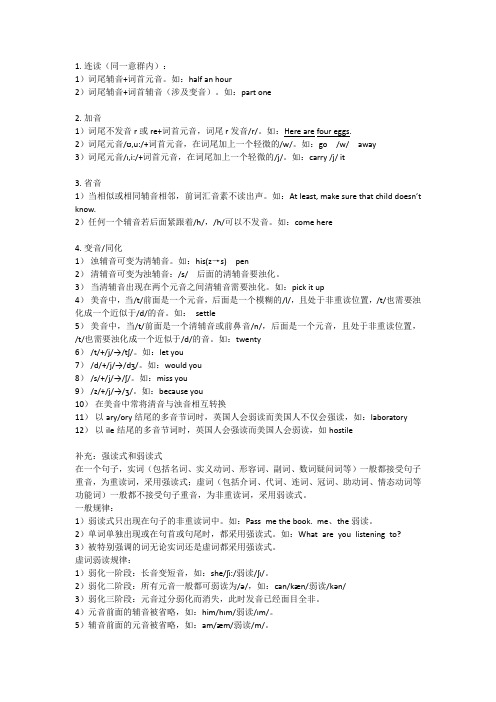
1.连读(同一意群内):1)词尾辅音+词首元音。
如:half an hour2)词尾辅音+词首辅音(涉及变音)。
如:part one2.加音1)词尾不发音r或re+词首元音,词尾r发音/r/。
如:Here are four eggs.2)词尾元音/ʊ,u:/+词首元音,在词尾加上一个轻微的/w/。
如:go/w/away3)词尾元音/ɪ,i:/+词首元音,在词尾加上一个轻微的/j/。
如:carry /j/ it3.省音1)当相似或相同辅音相邻,前词汇音素不读出声。
如:At least, make sure that child doesn’t know.2)任何一个辅音若后面紧跟着/h/,/h/可以不发音。
如:come here4.变音/同化1)浊辅音可变为清辅音。
如:his(z→s)pen2)清辅音可变为浊辅音:/s/后面的清辅音要浊化。
3)当清辅音出现在两个元音之间清辅音需要浊化。
如:pick it up4)美音中,当/t/前面是一个元音,后面是一个模糊的/l/,且处于非重读位置,/t/也需要浊化成一个近似于/d/的音。
如:settle5)美音中,当/t/前面是一个清辅音或前鼻音/n/,后面是一个元音,且处于非重读位置,/t/也需要浊化成一个近似于/d/的音。
如:twenty6)/t/+/j/→/tʃ/。
如:let you7)/d/+/j/→/dʒ/。
如:would you8)/s/+/j/→/ʃ/。
如:miss you9)/z/+/j/→/ʒ/。
如:because you10)在美音中常将清音与浊音相互转换11)以ary/ory结尾的多音节词时,英国人会弱读而美国人不仅会强读,如:laboratory 12)以ile结尾的多音节词时,英国人会强读而美国人会弱读,如hostile补充:强读式和弱读式在一个句子,实词(包括名词、实义动词、形容词、副词、数词疑问词等)一般都接受句子重音,为重读词,采用强读式;虚词(包括介词、代词、连词、冠词、助动词、情态动词等功能词)一般都不接受句子重音,为非重读词,采用弱读式。
英语音变规则总结举例
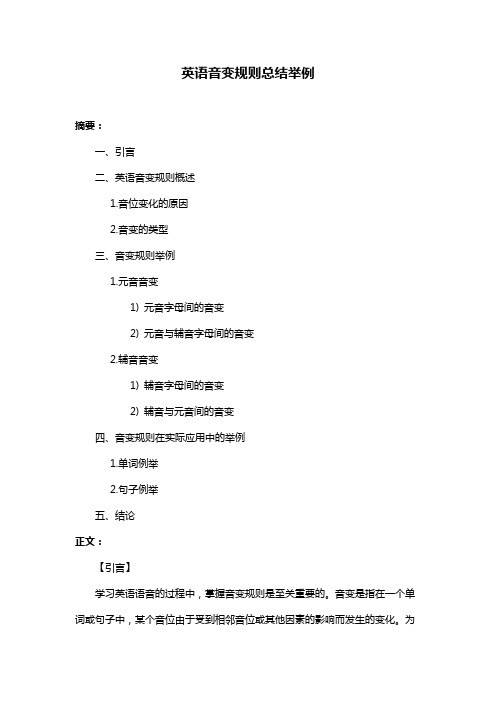
英语音变规则总结举例摘要:一、引言二、英语音变规则概述1.音位变化的原因2.音变的类型三、音变规则举例1.元音音变1) 元音字母间的音变2) 元音与辅音字母间的音变2.辅音音变1) 辅音字母间的音变2) 辅音与元音间的音变四、音变规则在实际应用中的举例1.单词例举2.句子例举五、结论正文:【引言】学习英语语音的过程中,掌握音变规则是至关重要的。
音变是指在一个单词或句子中,某个音位由于受到相邻音位或其他因素的影响而发生的变化。
为了帮助大家更好地理解和掌握这些规则,本文将详细介绍英语音变规则及其应用。
【英语音变规则概述】1.音位变化的原因音位变化主要受以下原因影响:1) 相邻音位的影响:当两个相邻的音位相互作用时,其中一个音位会发生音变以适应另一个音位。
2) 单词内部音节的压力:在一个单词中,音节之间的压力可能导致音位发生变化。
3) 发音器官的紧张程度:发音器官的紧张程度不同,可能导致音位发生变化。
2.音变的类型英语音变主要包括元音音变和辅音音变。
【音变规则举例】1.元音音变1) 元音字母间的音变:如“bed”中的[e]变为[],形成“begged”。
2) 元音与辅音字母间的音变:如“knight”中的[i:]变为[],形成“knighted”。
2.辅音音变1) 辅音字母间的音变:如“skate”中的[k]变为[g],形成“skated”。
2) 辅音与元音间的音变:如“boat”中的[c]变为[k],形成“boated”。
【音变规则在实际应用中的举例】1.单词例举- example:[ɡzmpl] → [gzmpl](元音音变)- tonight:[tnat] → [tnait](元音音变)- knight:[nat] → [natd](辅音音变)- skate:[sket] → [sketd](辅音音变)2.句子例举- She couldn"t believe her eyes.(她不敢相信自己的眼睛。
语音音变训练

语音音变训练第一大技巧---连读词尾辅音+词首元音1.My name is …2. I’m afraid…3. Take a look at it.4. Not at all.5. Can I help you?6. Time is up.7. Good idea. 8. Take it easy.9. Finish it in a minute if it is not difficult.10. Try to finish the job as soon as possible.词尾元音+词首元音当单词以aI、e、i、っI、I结尾+以元音开头的单词(加j连读)1. Thank you for see me of. (读时在of 前加j )2. I hope you will enjoy it.3. Hurry up!4. Don’t worry about it.当单词以au、o、u、v结尾+以元音开头的单词(加w连读)1. I can do it. 2. Go on with you work.3. How often do you swim?4. How about seeing a film this evening.第2大技巧---失去爆破词尾爆破音(b、p、d、t、g、k)+词首爆破音(b、p、d、t、g、k)1. Have a good time. 2. A big cake3. Take care.4. Please sit down.5. What do you mean?6. Ask Bob sit behind me7. No need to finish it now.8. A good cook could cook as many cookies as a good cook who could cook cookies.第3大技巧---不完全爆破词尾爆破音+摩擦音(f、v、s、z、h、∫、θ、З、)停顿一下1. I think so. 2. I need some more money.3. What would you advise me to do?4. You must pay in advance.词尾爆破音+破擦音(j 、w、t∫、dЗ、d r、t r、t s、d z)1. That joke.2. You shouldn’t treat women like objects.3. Can I take a picture with you?第4大技巧---浊化清辅音(p、t、k)浊化为浊辅音(b、d、g)元音+清辅音(p、t、k)+元音Ci t y le tt er wa t er pre tt y ci t izen 1. the sooner, the better. 2. I think you’d better see a doctor.3. You story just doesn’t hold water.4. What’s the matter with you?5. Stay out of this matter.元音+t +lI have a little problem.连读后的浊化I’ll think about it. Not at all.Can I have a look at it? Say it again.第5大技巧---同化相互同化:(1)t + j →t∫Nice to mee t y ou. I know a lot abou t y ou.I know tha t y ou can speak good English.Take care tha t y ou don’t spoil your new clothes. How abou t y ou? (2)d + j →dЗCould y ou tell me where the bus stop is?Di d y ou finish your homework yesterday?Woul d y ou show me the bathroom?(3) S + j →∫God ble ss y ou. Baby, I mi ss y ou everyday.Now look what a me ss y ou have done.(4)z + j →ЗHow i s y our boyfriend? How’s y our family?顺向同化:(1) 名词变复数:book s→s (清变清) bag s →z(浊变浊)I want to buy a lot of English book s.(2)名词变第三人称单数:She work s in Zaidong education.(3)动词变过去式或过去分词:ed\d→t(清) d(浊) Id(以t、d 结尾) She look ed very blue yesterday.(4) t + s→ts: All of the studen ts stop reading.(5)d + s →dz:My frien ds in American send me a message that the economic forecast is pleasant there.逆向同化Before I eat dinner, I read the new s paper for a while.He is not the man he us ed to be.Don’t worry, you get us ed to it in no time.You ha ve to get off here. That is all he ha s to do.I ha d to go and talk with Jim.第6大技巧---异化(1)sp+元音:How do you spend your leisure time?Actions speak louder than words.(2)s k+元音:I’m so scared.If I were a millionaire, I would start a school.(3)s t+元音:If you are ready, you may start your work.Would you like some steak?(4)str+元音:The work is still strange to him.He struck me with a stick.第7大技巧---缩读Want to→manna What do you manna do ?Be going to→be gonna I’m gonna study abroad.Have got to →gotta I gotta see you.Because→’cause I broke up with myboyfriend ’cause I don’t like him.Give me→gimme Gimme that book.Out of→outta Get outta here.you→ya How are ya?Are you→ya Where are you going?and →’n You ’n me. Rock ’n roll. What is the→what’sa What’sa matter?old →ol’look at that ol’man.sure→sher Are you sher?goodbye →g’bye I’m leaving, g’bye.What are you →wachya Wachya doing here?Ing →in’We are talkin’ about the education in China. Let me→lemme Lemme give you a n e xample.第8大技巧---略读词尾爆破音(b、p、d、t、g、k)Very good. I’m a student. Never give up.意群结尾的爆破音I could\ ’cause I believe I could.Mike likes to write\ by the nice bright ligh t a t night.I think \you shouldn’t pu sh him too hard.第9大技巧---被击穿的h音(1)him →’im (2)her→’erDon’t tell ’im. Please tell ’er.歌曲(Hey Jude)第10大技巧---弱读把元音弱化为\\Ladies and gentlemen. I have an English teacher. You and me. I’ll be back in half an hour. My wife and I are very happy.弱化为同类音长音→短音Me ---give me a sec to change film.We ---why don’t we go out for a while?She----she has an accent.弱到不发音:difficult、intention、information第11大技巧---鼻腔爆破(爆破音+n)爆破音不发Good night. Let me help you. I’m a student. Good morning. Her goodness was apparent to everyone. 第12大技巧--- 舌边爆破I have been very busy la te ly. Where have you been la te ly?I me t the old lady in the shop. He slept ba d ly.His foot was ba d ly hurt.第13大技巧--- 同类音的消失(s ---θs--∫z--z—З--З)What doe s th e man mean? This shop i s s o romantic.How wa s th e party last night? These clo thes are so beautiful.第14大技巧--- t音的消失(杀手音n)即可将t去掉Internet----I enjoy surfing on the internet.Twenty-----I take twenty thousand dollars with me. International--- Be an international Chinese.第15大技巧--- r音的连读Fo r e xample. My friend comes fro m a country fo r a way.I will keep my promise fo re ver. The re i s ten minutes left.The re a re over 600,000 kind s o f insects in the world.第16大技巧--- 辅音连缀重读后面那个音S+ m— He’s a smart businessman.S+ n----His shirt is as white as snow.S+ l---- Did you sleep well.S+ w----No sweet without sweat.P+ l----What’s your plan for the future.P+ r----The price of that house is high.G+ l----I am very glad that you could come.S+ p+ r----the rumor quickly spread through.S+ t+ r----He was a strict father.第17大技巧--- 情态动词完成时和过去将来完成时的不规则缩读Could have→could’ a Tom could’ a finish his homework. Must have→must’ a I must’ a very strange experience. Should have→should’ a I should’ a done it.Would have →would’a They would’a come to the meeting if he had know n a bou t i t.第18大技巧--- of不规则的缩读Kind of→kinda That is kinda battle in the war.A lot of→a lotta This week we are getting a lottabrand new information.Lots of→lotsa They all contain lotsa water.Sort of→sorta I sorta like’m.Bunch of→buncha The intent is for a buncha lawyers to make money. Because of→becausa It’s because that theoretical possibility that some people think it may be better to change.见词读音开音节:以元音结尾闭音节:以辅音结尾(map)(like)((bus、cut) 先确定单音节、双音节、多音节¤单词的重读:单音节的在第一个,双音节的在第一个,多音节的在倒数第三个⊙双音节单词发音:1.在两个音节的分界线上如果只有一(slogan,student,open,focus)2.在音节的分界线上如果有两个辅音字母,则分别划分到接弱读。
英语音标18大变音规则
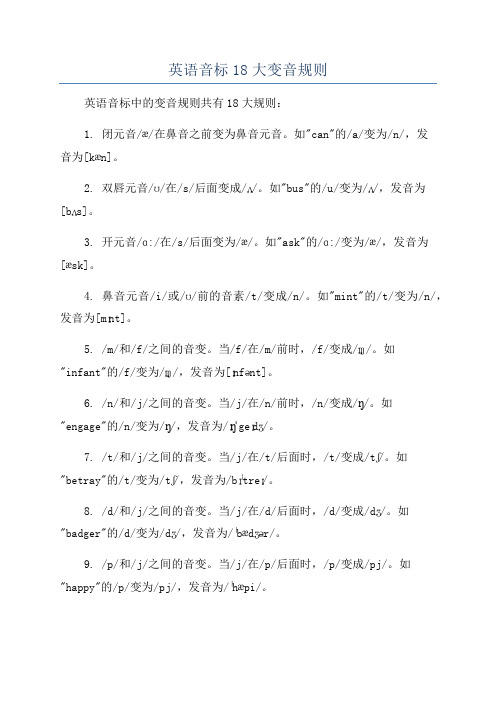
英语音标18大变音规则英语音标中的变音规则共有18大规则:1. 闭元音/æ/在鼻音之前变为鼻音元音。
如"can"的/a/变为/n/,发音为[kæn]。
2. 双唇元音/ʊ/在/s/后面变成/ʌ/。
如"bus"的/u/变为/ʌ/,发音为[bʌs]。
3. 开元音/ɑ:/在/s/后面变为/æ/。
如"ask"的/ɑ:/变为/æ/,发音为[æsk]。
4. 鼻音元音/i/或/ʊ/前的音素/t/变成/n/。
如"mint"的/t/变为/n/,发音为[mɪnt]。
5. /m/和/f/之间的音变。
当/f/在/m/前时,/f/变成/ɱ/。
如"infant"的/f/变为/ɱ/,发音为[ɪnfənt]。
6. /n/和/j/之间的音变。
当/j/在/n/前时,/n/变成/ŋ/。
如"engage"的/n/变为/ŋ/,发音为/ɪŋˈgeɪdʒ/。
7. /t/和/j/之间的音变。
当/j/在/t/后面时,/t/变成/tʃ/。
如"betray"的/t/变为/tʃ/,发音为/bɪˈtreɪ/。
8. /d/和/j/之间的音变。
当/j/在/d/后面时,/d/变成/dʒ/。
如"badger"的/d/变为/dʒ/,发音为/ˈbædʒər/。
9. /p/和/j/之间的音变。
当/j/在/p/后面时,/p/变成/pj/。
如"happy"的/p/变为/pj/,发音为/ˈhæpi/。
10. /g/和/j/之间的音变。
当/j/在/g/后面时,/g/变成/dʒ/。
如"digest"的/g/变为/dʒ/,发音为/daɪˈdʒest/。
11. /k/和/j/之间的音变。
当/j/在/k/后面时,/k/变成/tʃ/。
常见的英语语音音变现象

常见的英语语音音变现象一、音的浊化(Sound Voicing)英语国际音标(IPA)26 个辅音中,包含了6 个爆破音即:/k、g/ ,/ p 、b/ , / t 、d/ ,其中/ k、p 、t/ 为清辅音,/ g、b、d/ 为浊辅音。
但当清辅音/ k、p 、t/ 与清辅音/ s/ 连拼即/ sk、sp 、st/ 时,为了发音方便而发生了“浊化”,即要读成/ sg、sb、sd/ 。
二、音的不完全爆破(Sound Incomplete Plosive)在朗读句子或某些单词时,爆破音/p/, /b/, /t/,/d/,/k/,/g/在一定情况下不必爆破出来,就是说气流不必冲破阻碍,而只是发音器官在口腔中形成阻碍,稍作停顿后马上过渡到后面的音,这种现象叫不完全爆破。
不完全爆破可发生在单词内部,如bla (ck) board, foo (t)ball,ke (p) t等.括号中的辅音字母对应的辅音音素/k/,/t/,/p/稍作停顿,没发出音来。
不完全爆破在两个相邻单词之间出现的情况非常多.①爆破音中的任何两个爆破音相邻时,前一爆破音失去爆破。
如a bi(g) car等.②爆破音中的任何一个后接摩擦音/f/,/s/,//,//时,前面的爆破音失去爆破.如I didn\'(t) say so。
③爆破音后接/t/,/d/,/tr/, /dr /时,前面的爆破音失去爆破。
如a grea(t)change等。
④爆破音后接/m/,/n/,/l/时,前面的爆破音失去爆破。
如a bi(t) more expensive等。
三、音的连读(Sound Liaison)单个词的发音与其在词组或句子中的发音有时不尽相同,如连读现象.在连贯说话或朗读时,前一个词的末尾辅音和后一个词的词首元音可以连在一起读。
连读往往会被误认为是一个新的单词或语法结构上的不完整。
相邻的两词在意义上必须密切相关,同属一个意群.连读所构成的音节一般都不重读,只需顺其自然地一带而过,不可读得太重,也不可音.(连读符号:~)(1)“辅音+元音”型连读在同一个意群里,如果相邻两词中的前一个词是以辅音结尾,后一个词是以元音开头,这就要将辅音与元音拼起来连读.I'm~an~English boy.It~is~an~old book。
英语音标18大变音规则
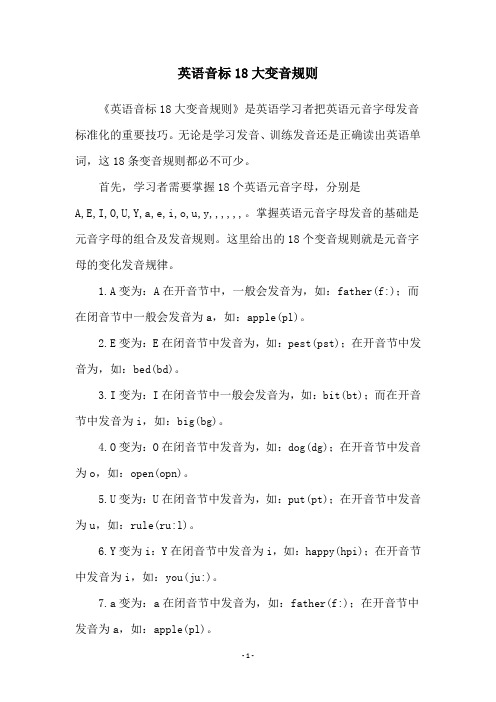
英语音标18大变音规则《英语音标18大变音规则》是英语学习者把英语元音字母发音标准化的重要技巧。
无论是学习发音、训练发音还是正确读出英语单词,这18条变音规则都必不可少。
首先,学习者需要掌握18个英语元音字母,分别是A,E,I,O,U,Y,a,e,i,o,u,y,,,,,,。
掌握英语元音字母发音的基础是元音字母的组合及发音规则。
这里给出的18个变音规则就是元音字母的变化发音规律。
1.A变为:A在开音节中,一般会发音为,如:father(f:);而在闭音节中一般会发音为a,如:apple(pl)。
2.E变为:E在闭音节中发音为,如:pest(pst);在开音节中发音为,如:bed(bd)。
3.I变为:I在闭音节中一般会发音为,如:bit(bt);而在开音节中发音为i,如:big(bg)。
4.O变为:O在闭音节中发音为,如:dog(dg);在开音节中发音为o,如:open(opn)。
5.U变为:U在闭音节中发音为,如:put(pt);在开音节中发音为u,如:rule(ru:l)。
6.Y变为i:Y在闭音节中发音为i,如:happy(hpi);在开音节中发音为i,如:you(ju:)。
7.a变为:a在闭音节中发音为,如:father(f:);在开音节中发音为a,如:apple(pl)。
8.e变为:e在闭音节中发音为,如:bed(bd);在开音节中发音为e,如:get(gt)。
9.i变为:i在闭音节中发音为,如:bit(bt);在开音节中发音为i,如:big(bg)。
10.o变为:o在闭音节中发音为,如:dog(dg);在开音节中发音为o,如:open(opn)。
11.u变为:u在闭音节中发音为,如:put(pt);在开音节中发音为u,如:rule(ru:l)。
12.y变为i:y在闭音节中发音为i,如:happy(hpi);在开音节中发音为i,如:you(ju:)。
13.Ai变为e:Ai在闭音节中发音为e,如:rain(ren)。
英语中的音变现象

英语中的音变现象英语中的音变现象源于一个“省力”(Economy)原则。
牢记省力原则,让我们读英语时唇舌处于放松的状态,轻松的去读英语。
主要有连读、失音、弱化、浊化、同化、重音、缩读等形式。
一、连读1、以辅音结尾的单词+元音开头的单词:要连读如:all out of2、以辅音结尾的单词 + h开头的单词h不发音,与前面的辅音如:what wil(l he) [wili]do?二、音的同化音的同化也是一种连读的现象,两个词之间非常平滑的过渡,导致一个音受临音影响而变化。
主要是以下三种方式:1、辅音[d]与[j]相邻时,被同化为[dr]:Would you....?2、辅音[t]与[j]相邻时,被同化为[t∫]:Can’t you...?3、辅音[s]与[j]相邻时, 被同化为[∫]: Miss you三、失音由于失去爆破是失音的一种现象,摩擦音也会被失去,所以统称为失音。
注意:爆破音并不是完全失去,仍然形成阻碍,把气流堵在里面,但不爆破,直接发出相邻的辅音。
规则:1、辅音爆破音或摩擦音后面跟的是爆破音、破擦音和摩擦等,前面的辅音要失去爆破。
这样的例子有很多很多,红色标注的辅音不发音:如,Sit down, Good night四、浊化1、[s] 后面的清辅音要浊化Discussion: [k] 浊化成 [g]Stand: [t] 浊化成[d]Expression: [p]浊化成2、美音中:[t] 在单词的中间被浊化成[d]如:writer,听起来和 rider 的发音几乎没有区别out of美国人和加拿大人发音为了省事,习惯清音浊化,尤其是[t]在单词的中间一定会浊化成[d],但英国人发音不会这样,这也是英音和美音的一大区别。
了解这一浊化原则,会给听力带来一些帮助。
五、弱读一般来说:实词重读,如动词、名词、副词等;虚词弱读,如介词、代词等弱读的规则一般是:元音音节弱化成 [e] 或比如说如下几个单词:for/to/some/does/of查字典会发现这些词都至少有两种读音,如for: 重读时[fR:] , 弱读时 [fE]。
英语口语中的变音现象及读音规则
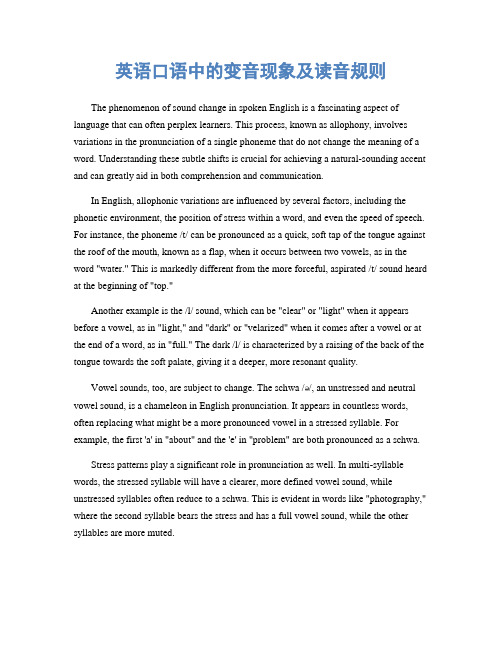
英语口语中的变音现象及读音规则The phenomenon of sound change in spoken English is a fascinating aspect of language that can often perplex learners. This process, known as allophony, involves variations in the pronunciation of a single phoneme that do not change the meaning of a word. Understanding these subtle shifts is crucial for achieving a natural-sounding accent and can greatly aid in both comprehension and communication.In English, allophonic variations are influenced by several factors, including the phonetic environment, the position of stress within a word, and even the speed of speech. For instance, the phoneme /t/ can be pronounced as a quick, soft tap of the tongue against the roof of the mouth, known as a flap, when it occurs between two vowels, as in the word "water." This is markedly different from the more forceful, aspirated /t/ sound heard at the beginning of "top."Another example is the /l/ sound, which can be "clear" or "light" when it appears before a vowel, as in "light," and "dark" or "velarized" when it comes after a vowel or at the end of a word, as in "full." The dark /l/ is characterized by a raising of the back of the tongue towards the soft palate, giving it a deeper, more resonant quality.Vowel sounds, too, are subject to change. The schwa /ə/, an unstressed and neutral vowel sound, is a chameleon in English pronunciation. It appears in countless words, often replacing what might be a more pronounced vowel in a stressed syllable. For example, the first 'a' in "about" and the 'e' in "problem" are both pronounced as a schwa.Stress patterns play a significant role in pronunciation as well. In multi-syllable words, the stressed syllable will have a clearer, more defined vowel sound, while unstressed syllables often reduce to a schwa. This is evident in words like "photography," where the second syllable bears the stress and has a full vowel sound, while the other syllables are more muted.The rhythm of English, which is stress-timed, means that stressed syllables occur at regular intervals, with unstressed syllables filling the gaps, often with reduced vowels. This rhythm is essential to mastering the natural flow of the language.Linking and elision are also key to fluid English speech. Linking occurs when a word ending in a consonant is followed by a word beginning with a vowel, allowing for a smoother transition between words. Elision, on the other hand, involves the omission of sounds in rapid speech, such as the 't' in "Christmas" often being silent.In conclusion, the rules of English pronunciation are complex and require careful study and practice. By paying attention to the nuances of allophony, stress patterns, rhythm, linking, and elision, learners can improve their spoken English, making it more comprehensible and authentic. Mastery of these elements is not only beneficial for communication but also enriches one's understanding of the language's structure and beauty. The journey to fluency is indeed a challenging one, but with persistence and attention to detail, it is certainly achievable. 。
英语音变规则总结举例
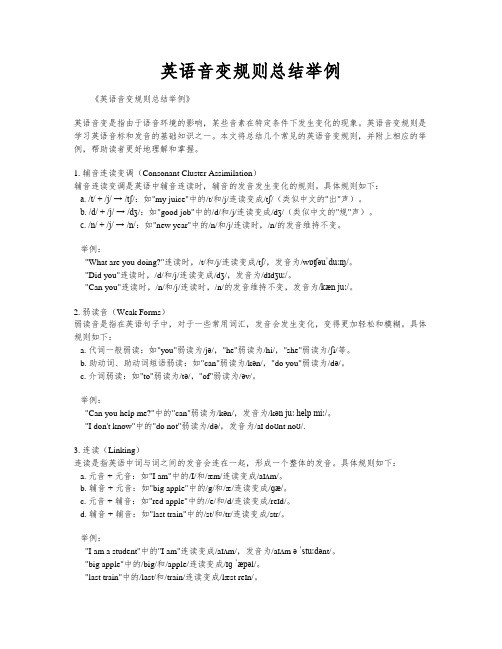
英语音变规则总结举例《英语音变规则总结举例》英语音变是指由于语音环境的影响,某些音素在特定条件下发生变化的现象。
英语音变规则是学习英语音标和发音的基础知识之一。
本文将总结几个常见的英语音变规则,并附上相应的举例,帮助读者更好地理解和掌握。
1. 辅音连读变调(Consonant Cluster Assimilation)辅音连读变调是英语中辅音连读时,辅音的发音发生变化的规则。
具体规则如下:a. /t/ + /j/ → /tʃ/:如"my juice"中的/t/和/j/连读变成/tʃ/(类似中文的"出"声)。
b. /d/ + /j/ → /dʒ/:如"good job"中的/d/和/j/连读变成/dʒ/(类似中文的"规"声)。
c. /n/ + /j/ → /n/:如"new year"中的/n/和/j/连读时,/n/的发音维持不变。
举例:- "What are you doing?"连读时,/t/和/j/连读变成/tʃ/,发音为/wɒʧəuˈduːɪŋ/。
- "Did you"连读时,/d/和/j/连读变成/dʒ/,发音为/dɪdʒuː/。
- "Can you"连读时,/n/和/j/连读时,/n/的发音维持不变,发音为/kæn juː/。
2. 弱读音(Weak Forms)弱读音是指在英语句子中,对于一些常用词汇,发音会发生变化,变得更加轻松和模糊。
具体规则如下:a. 代词一般弱读:如"you"弱读为/jə/,"he"弱读为/hi/,"she"弱读为/ʃi/等。
b. 助动词、助动词短语弱读:如"can"弱读为/kən/,"do you"弱读为/də/。
雅思英语常见语音现象
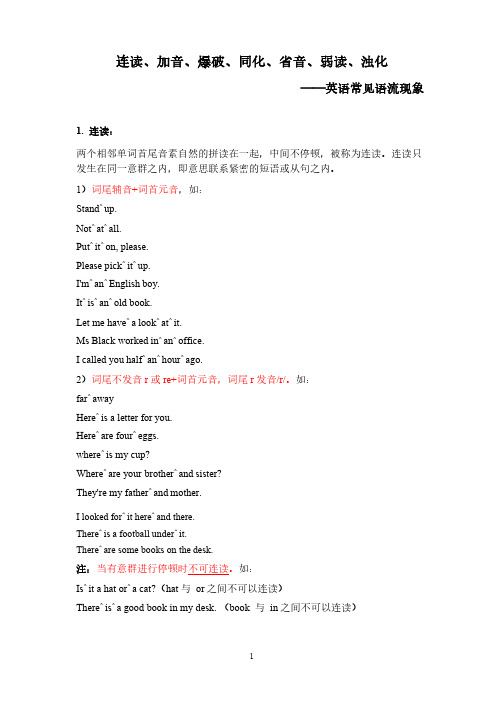
连读、加音、爆破、同化、省音、弱读、浊化——英语常见语流现象1.连读:两个相邻单词首尾音素自然的拼读在一起,中间不停顿,被称为连读。
连读只发生在同一意群之内,即意思联系紧密的短语或从句之内。
1)词尾辅音+词首元音,如:Standˆup.Notˆatˆall.Putˆitˆon,please.Please pickˆitˆup.I'mˆanˆEnglish boy.Itˆisˆanˆold book.Let me haveˆa lookˆatˆit.Ms Black worked inˆanˆoffice.I called you halfˆanˆhourˆago.2)词尾不发音r或re+词首元音,词尾r发音/r/。
如:farˆawayHereˆis a letter for you.Hereˆare fourˆeggs.whereˆis my cup?Whereˆare your brotherˆand sister?They're my fatherˆand mother.I looked forˆit hereˆand there.Thereˆis a football underˆit.Thereˆare some books on the desk.注:当有意群进行停顿时不可连读。
如:Isˆit a hat orˆa cat?(hat与or之间不可以连读)Thereˆisˆa good book in my desk.(book与in之间不可以连读)Can you speakˆEnglish or French?(English与or之间不可以连读)Shall we meet atˆeight or ten tomorrow morning?(meet与at,eight与or之间不可以连读)She opened the door and walkedˆin.(door与and之间不可以连读)2.加音:在连贯的语流中,人们往往会在两个元音之间加入一个外加音帮助发音,从而更加流畅地表达意思。
英语音变规则总结举例
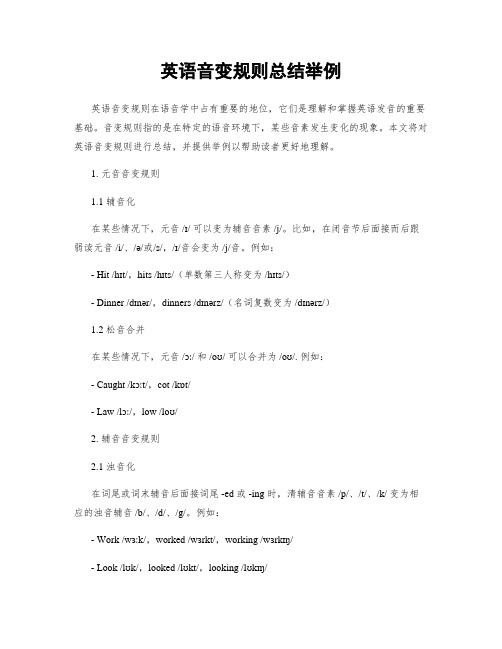
英语音变规则总结举例英语音变规则在语音学中占有重要的地位,它们是理解和掌握英语发音的重要基础。
音变规则指的是在特定的语音环境下,某些音素发生变化的现象。
本文将对英语音变规则进行总结,并提供举例以帮助读者更好地理解。
1. 元音音变规则1.1 辅音化在某些情况下,元音 /ɪ/ 可以变为辅音音素 /j/。
比如,在闭音节后面接而后跟弱读元音 /i/、/ə/或/s/,/ɪ/音会变为 /j/音。
例如:- Hit /hɪt/,hits /hɪts/(单数第三人称变为 /hɪts/)- Dinner /dɪnər/,dinners /dɪnərz/(名词复数变为 /dɪnərz/)1.2 松音合并在某些情况下,元音 /ɔː/ 和 /oʊ/ 可以合并为 /oʊ/. 例如:- Caught /kɔːt/,cot /kɒt/- Law /lɔː/,low /loʊ/2. 辅音音变规则2.1 浊音化在词尾或词末辅音后面接词尾 -ed 或 -ing 时,清辅音音素 /p/、/t/、/k/ 变为相应的浊音辅音 /b/、/d/、/g/。
例如:- Work /wɜːk/,worked /wɜrkt/,working /wɜrkɪŋ/- Look /lʊk/,looked /lʊkt/,looking /lʊkɪŋ/2.2 破裂音变擦音在词尾或词尾辅音后面接词尾 -s 时,破裂音 /p/、/t/、/k/ 可以变为相应的擦音辅音 /b/、/d/、/g/. 例如:- Keep /kiːp/,keeps /kiːps/- Stop /stɒp/,stops /stɒps/2.3 浊化在词首辅音后面接元音时,清音辅音可以变为相应的浊音辅音。
例如:- Pig /pɪɡ/,big /bɪɡ/- Cat /kæt/,gat /ɡæt/3. 辅音-音素交互影响规则3.1 鼻音变化当一个词尾辅音接在鼻音 /m/ 或 /n/ 之后时,鼻音 /m/ 或 /n/ 会影响其后的清辅音变为相应的鼻音辅音。
语音音变现象训练1

语音音变现象训练系流利口语必备的18大发音技巧第1大技巧——连读连读的2大规律:第一大规律:词尾辅音+词首元音My name i s...I’m afraid...Take a look at itNot at allCan I help you ?Time is up.Good idea.Take it easy.Finish it in a minate if it is not difficult. Try to finish the job as soon as possible.第二大规律:词尾元音+词首元音(1)加jThank you for coming to see me off.I hope you will enjoy it.Hurry up.Don’t worry about it.(2)加wI can do it.Go on with you work..How often do you swim?How about seeing a film this evening?流利口语必备的18大发音技巧第2大技巧——失去爆破词尾爆破音(b,p, d, t, g ,k)+词首爆破音(b,p, d, t, g ,k)Have a good time.A big cake.Take care .Please sit down.What do you mean?Ask bob to sit behind me.No need tofinish it now.A good cook could cook as many cookies as a good cook who could cook cookies.流利口语必备的18大发音技巧第3大技巧——不完全爆破不完全爆破的2大规律:第一大规律:词尾爆破音+摩擦音I think so.I need some more money.What would you advise me to do?You must pay in advance.第二大规律:词尾爆破音+爆破音That joke.You shouldn’t treat women like objects. Can I take a picture with you?流利口语必备的18大发音技巧第4大技巧——浊化浊化的3大规律第一大规律:元音+清辅音+元音City letter water pretty citizen The sooner,the better.I think you’d better see a docter.Your story just doesn’t hold watter. What’s the matter with you?Stay out of this matter.第二大规律:元音+T+LI have a little problem.第三大规律:连读后的浊化I’ll think about it.Can I have a look at it?Not at all.Say it again.流利口语必备的18大发音技巧第5大技巧——同化同化的3大规律第一大规律:相互同化(1)t+jnice to meet you.I know a lot about you.I know that you can speak good English.Take care that you don’t spoil your new clothes. How about you.(2)d+jCould you tell me where the bus stop is?Did you finish your homework yesterday? Would you show me the bathroom?(3)s+jGod bless you.Baby , I miss you every day.Now look what a mess you have done.(4)z+jHow is your boyfriend?How’s your family?第二大规律:顺相同化(1)名词变复数:I want to buy a lot of English.(2)动词变第三人称单数:She works in Reborn Education.(3)动词变过去式或过去分词:She looked very blue yesterday.(4)t+s: All of the students stop reading.It’s raining cats and dogs.(5)d+s: My friends in American send me a message that the economicforecast is pleasant there.第三大规律:逆向思维(1)B efore I eat dinner, I read the newspaper for a while.(2)A: He is not used the men he used to be.(3)B: Don’t worry, you get used to it in no time.(4)Y ou have to get off here.(5)T hat is all he has to do.(6)I have to go and talk with jim.流利口语必备的18大发音技巧第6大技巧——异化异化的4大规律:(1) sp+元音:How do you spend your leisure?Actions speak louder than words.(2) sk+元音:I’m so scared.If I were a millionaire, I would start a school.(3)st+元音:If you are ready , you may start your work.Would you like some steak?(4) str+元音:The work is still strange to him.He struck me with a stick.流利口语必备的18大发音技巧第7大技巧------缩读看过美语歌曲或美语影剧视字幕或剧本的学生可能比较熟悉下面这些缩读:学完这部分,你就是口语高手,电影之王。
举例说明各种语流音变的现象

举例说明各种语流音变的现象语流音变是人们在说话过程中,由于语流的连续性造成的音的改变。
在不同的语言和方言中,语流音变现象不同。
以下是几种常见的语流音变的现象。
1.连读现象在英语中,一个单词的结尾辅音与下一个单词的开头辅音有连读的现象。
例如,"can't you"发音时,连读成“kæn(t)ju”。
在日语中,两个汉字连读时,音变成一个新的音,称为「促音」。
例如,「きっと」发音时,连读成"kit(to)"。
2.消音现象在普通话中,有些单音节词的声母或韵母在快速说话时会消音。
例如,“儿子”这个词发音时,其中的“r”字母会被省略掉。
在西班牙语中,某些单词的辅音字母会被消音。
例如,“hablo español”(我说西班牙语)发音时,其中的“h”和“b”被省略。
3.模糊音现象在英语中,有些辅音音素在特定环境下发生模糊。
例如,在“water”这个单词中,辅音/t/和/r/在大多数情况下发音清晰,但在后面跟了一个元音时,/t/和/r/的发音会变得模糊,成为/u/的音素,发音成为"waʔ-ər"。
在普通话中,有些音素会在特定情境下发生模糊。
例如,在“nǐ hǎo”这个词语中,第一个音节的/n/和/i/在连读时会发生模糊,发音成为"níhǎo"。
4.进行音和尾音现象在英语中,很多单词的词尾辅音会发生变化,特别是在动词加-ing时。
例如,在“walking”这个单词中,词尾/k/的发音被变成/g/发音,读成/wɔːkɪŋ/。
在法语中,一些名词的末音会被省略掉,例如,“le chocolat”(巧克力)发音时,省略掉了最后的/t/。
综上所述,语流音变是语言不可避免的一个现象。
它可以使说话者的语言更加流畅,但也可能造成语言的不规范和误解。
因此,学习者在学习语言时,需要注意并了解不同语言的语流音变现象,丰富自己的语言技能,避免误解和搞错。
帮你听懂地道英语——英语中音变现象分析

英语中的音变现象事实上归结为省力现象,主要音变如下:一、连读
(1)以辅音结尾的单词加以元音开头的的单词时要连读Eg:I li(ke a)nother bow(l o)f rice.
(2)以辅音结尾的单词加“h”开头的单词时“h”不发音Eg:Tel(l h)im to as(k h)er to lea(ve h)im.
二、同化:两个词之间非常平滑的过渡,导致一个音受临音影响而变化。
(1)辅音【d】与【j】相邻时,被同化为【dʒ】eg:would you…? (2)辅音【t】与【j】相邻时,被同化为【tʃ】eg:can’t you…? (3)辅音【s】与【j】相邻时,被同化为【ʃ】eg:I miss you.
三、失音
辅音爆破音或摩擦音后面跟爆破音、破擦音或摩擦音时,前面的辅音要失去爆破。
Eg:sit down/big cake/good night
四、浊化
(1)【s】后面的清辅音要浊化eg:discussion/stand
(2)美音中【t】在单词的中间被浊化成【d】eg:writer 但英音不会这样
五、弱读
一般来说实词重读,如动词、名词、副词等;虚词弱读,如介词、代词等
弱读的一般规则是元音音节弱化为【E】eg:for【fR:】->【fE】六、节奏:事实上很重要,区分中国人与美国人说的英语的根本标准,只有靠反复摸索练习。
听力口语中的连读与音变

英语口语中连读规则我大致知道,辅音+元音、双爆破、辅音+h单词、爆破+摩擦等等,但是运用起来总是不近人易,下面有几个句子是新概念英语第2册中第4、5课的部分句子,听了数遍,就是听不出来个个数,请高手指点迷津。
1.he has (just bought)……just中t和bought中b应该属于双爆破,但是语音中那个人说just最后的t说的很清楚,并没有失爆啊?2.so he has……上面的这个该怎么连读啊,听上去感觉像是he和has 连读在了一起,有点像‘yes ’的发音3.carried the、covered the上面这两个在语音中,-ed怎么没了,听起来像是carry the、cover the,这是怎么回事啊?4.Mr Scott has sent a great many requests (for)spare (parts and)other urgent messages from onegarage to the other.这句中for听不出来读的像什么,我记得英语里for有两个读音啊,一个是fɔ:,一个是fə,在语音里听的哪个都不像?还有parts and 听起来像是s和and连的很近,而与part有很明显的分开,这是什么原因啊?Answers:01.jus(t) bought,两个爆破音相邻读后面的。
02.so he (h)as,这种现象叫弱读,或者叫“音的脱落”,就是读没了。
汉语中也有这种现象,只不过我们不在意而已,比如“豆腐”,我们经常说成“douf(u)”,把u丢掉了。
03.carried the、covered the ,如果两个很相似的音连在一起,你尽管读后面一个就成,这是为了保持语流的顺畅,不然说出了会“一蹦一蹦的”显得不地道、不流畅。
04.for在英语中叫虚词,这类词读的时候不要很重,读作fə,甚至干脆成了ə,甚至读没了也不稀奇。
如where,常常读成wə等。
- 1、下载文档前请自行甄别文档内容的完整性,平台不提供额外的编辑、内容补充、找答案等附加服务。
- 2、"仅部分预览"的文档,不可在线预览部分如存在完整性等问题,可反馈申请退款(可完整预览的文档不适用该条件!)。
- 3、如文档侵犯您的权益,请联系客服反馈,我们会尽快为您处理(人工客服工作时间:9:00-18:30)。
第一大技巧第一大规律:词尾辅音+词首元音My name is .....Take a look at it.....Not at allCan i helpTime is upGood ideaTake it easyFinish it in a minute if it is not diffcult Try to finish the job as soon as possible第二大规律:词尾元音+词首元音(1)加JThank you for coming to see me off I hope you will enjoy itHurry upDont worry about it(2)加WI can do itGo on with your workHow often do you swimHow about seeing a film this evening第2大技巧失去爆破词尾爆破音(b p t g k )+词首爆破音(b p d t g k )Have a good time .A big cakeTake carePlease sit downWhat do you meanAsk bob to sit behind meNo need to finish it NowA good cook could cook as many cookies as a good cook who could cook cookies第三大技巧;不完全爆破第一大规律:词尾摩擦音+摩擦音ps注意停顿,每句都有I think soI need some more moneyWhat would you advise me to doYou must pay in advance第二大规律:词尾爆破音+爆破音That jokeYou shouldnt treat women like object Can i take a picture with you ?第四大技巧——————浊化第一大规律:原音+清辅音+元音City letter water pretty citizenThe sooner,the betterI think youd better see a doctor Your story just dosent hold water Whats the matter with youStay out of this matter第二大规律:元音+t+LI have a little problem第三大规律:连读后的浊化Ill think about itCan i have a look at itNot at allSay it again第5大技巧第一大规律:相互同化(1)t+j——打不出来了Nice to meet youI know a lot about youI know you can speak good englishTake care that you dont spoil your new clothes How about you(2)d+j--打不出Could you tell me where the bus stop isDid you finish your homework yesterday Would you show me the bathroom(3)s+j--打不出来God bless youBaby i miss you everydayNow look what a mess you have done(4)z+j--打不出来How is your boyfriendHows your family第二大规律:顺向同化(1)名词变复数:i want to buy a lot of english books(2)动词变第三人称单数:she works in zaidong education(3)动词变过去式或过去分词;she looked very blue yesterday(4)T+s :all of the students stop reading(5)D+s:my friends in america send me a message that the economic forecast is pleasant there第三大规律:逆向同化(1)before i eat dinner , i read the newspaper for a while(2)He is not the man he used to be(3)Dont worry , you get used to it in no time(4)You have to get off here(5)That is all he has to do(6)I had to go and talk with jim第六大技巧异化(1)sp+元音:how do you spend your leisure timeAction speak louder than words(1)sk+元音:im so scaredIf i were a millionaire i would start a school(3)st+元音if you are ready,you may start your workWould you like some steak?(4)str+元音:the work is still strange to himHe struck me with a stick第七大技巧缩读看过美语歌词或美语电影的同学。
(1)want to ----wanna what do you wanna do(2) Be going to -----be gonna im gonna study abroad(3)Have got to --gotta i gotta see you(4)Because ----cause i broke up with my boyfriend cause i dont like him(5)Give me ----gimme gimme that book(6)Out of -----outta get outta here(7)You ---ya how are ya(8)Are you -- where are you going(9)And ---n youn me rockn roll(10)What is the ---whatsa whatsa matter(11)Old ---ol look at that olman(12)Sure--sher are you sher(13)Goodbye----gbye im leaving gbye(14)What are you wachya/wacha wachya doing here(15)Ing---in we are talikin about the education in china(16)Let me --lemme lemme give you an example第八大技巧略读第一大规律:词尾的爆破Very goodIm a studentNever give up第二大规律:意群结尾的爆破音I could cause i believe i couldMike likes to write by the nice bright light at nightI think you shouldnt push him too hard第9大技巧被击穿的H音(1)him--im dont tell im(2)Her--er please call er实例操作Hey jude ,孙燕姿的hey jude。
自己去听第十大技巧--弱读弱毒三大规律:把元音弱化为打不出来Ladies and gentlemenYou and meI have an english teacherI’ll be back in half an hourMy wife and i are very happy第二大规律:弱化为同类音长音---短音Me give me a sec to change filmWe why don’t we go out for a walkShe she has an accent第三大规律:弱到不发音DifficultIntentionInformation第十一大技巧---鼻腔爆破Good nightGood morningLet me help youHer goodness was apparent to everyone I’m a student第十二大技巧--舌边爆破I have been very busy latelyWhere have you been latelyI met the old lady in the shopHe slept badlyHis foot was badly hurt第十三大技巧-----同类音消失What does the man meanThis shop is so romanticHow was the party last nightThese clothes are so beautiful第十四大技巧---t音的消失(杀手音n)Internet i enjoy surfing on the internet Twenty i take 20 thousand dollars with me International be an International chinese第十五大技巧---r音的连读、For exampleMy friend comes from a country far awayI will keep my promise foreverThere is ten minutes leftThere are over 600,000 kinds of insects in the world第十六大技巧--辅音连缀S+m he’s a smart businessmanS+n his shirt is as white as snowS+l did you sleep wellS+w no sweet without sweatP+l what’s your plan for the futureP+r the price of that house is highG+l i am very glad that you could comeS+p+r the rumor quickly spread throughS+t+r he was a strict farther第十七大技巧---情态动词完成时过去将来时缩写Could have ----could’a tom could’a finished homeworkMust have------must’a i must’a very strange experienceShould have ----should’a i should have done itWould have -----would’a they would’a come to the meeting if he had known about it第18大发音技巧----of不规则缩读Kind of ---kinda that is one kind battle in this warA lot of ---a lotta this week we are getting a lotta brand new information Lots of --lotsa they all contain lotsa waterSort of----sorta i sorta like’mBunch of ----buncha the intent is for a buncha lawyers to make money Because of --becausea it’s because of that theoretical possibility that some people think it may be better to change。
